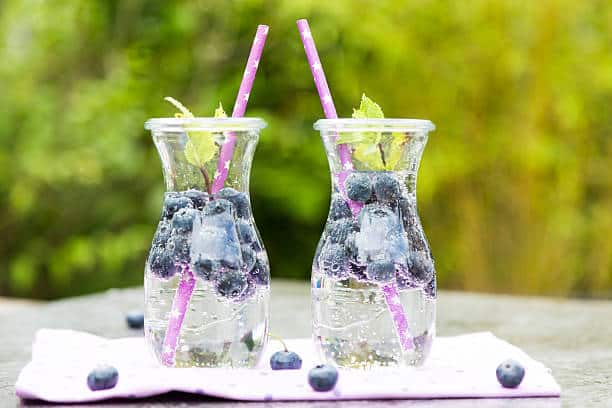Do You Really Need Alkaline, Electrolyte, or Flavored Water?


Stroll through any grocery store, and you’ll likely encounter an aisle that looks more like a wellness boutique than a place to buy a basic human necessity. From alkaline water claiming to balance your pH, to electrolyte-infused options promoting muscle recovery, to fruit-flavored water promising “hydration plus,” it’s easy to believe that plain old water just isn’t enough anymore.
But are these premium waters really delivering better health benefits?
Not really, according to experts at Tufts University.
What Experts Say: Hydration is Key, Not the Type of Water
“There’s no physiological basis that there’s some metabolic benefit to these specialty waters over just regular, plain old water,” says Roger Fielding, a senior scientist at the Jean Mayer USDA Human Nutrition Research Center on Aging at Tufts.
The truth? Most people don’t suffer from electrolyte imbalances or poor pH regulation — they’re just mildly dehydrated because they don’t drink enough fluids throughout the day.
“If you have a preference for a beverage and that’s going to make you drink more… well, have at it,” Fielding notes.
In other words, if a certain beverage encourages you to hydrate more consistently, it’s serving a purpose — but it’s not better than regular water in any fundamental, physiological way.

Electrolyte Waters: Useful or Overrated?
Electrolytes — including sodium, potassium, magnesium, and calcium — are minerals that help regulate nerve and muscle function, hydration, and pH balance. They’re essential to health, but your body already does a great job of managing them through diet and natural regulation.
Fielding explains that unless you’re sweating excessively — think marathon runners, triathletes, or those doing hot yoga in high heat — the risk of electrolyte imbalance is extremely low.
But What About Sodium?
One concern with electrolyte-enhanced waters is added sodium. While sodium is vital for hydration, too much can raise your blood pressure and increase the risk of heart disease.
“If someone consumes large amounts of water with high levels of sodium, they could elevate their risk of hypertension,” Fielding warns.
However, he adds that most commercial electrolyte waters contain fairly dilute concentrations, not enough to cause harm for the average person unless consumed in very high amounts.

Alkaline Water: Beneficial or Just a Trend?
Alkaline water is marketed as a way to balance the body’s pH, counteracting acidity caused by diet and lifestyle. It typically has a pH above 7, compared to neutral water, which sits at pH 7.
But does it actually help?
“There’s no direct evidence that shows a benefit from alkaline water interventions compared with non-alkaline water interventions,” says Dr. Bess Dawson-Hughes, professor of medicine at Tufts.
That said, older adults who consume a diet high in acid-forming foods (like animal protein and grains) may benefit from more dietary alkali. As we age, our kidneys lose some efficiency in removing acid from the body. This can lead to a condition where bone mass is broken down to neutralize acid, a risk factor for osteoporosis.
Alkaline Water for Seniors?
In some older adults, alkaline water might provide modest support, though experts emphasize that eating more fruits and vegetables — which are naturally alkaline — is a more effective and proven approach.
“Bone is, in essence, an alkali reservoir,” says Dawson-Hughes. “If the kidney can’t get rid of excess acid, bone is resorbed.”
RELATED: Wait—Water Infusions Can Target Specific Health Issues?

Flavored Waters: Hydration With a Twist
Flavored waters — especially those with zero calories or no added sugar — can be a helpful tool for those who find plain water boring or hard to remember.
“If you’re more likely to rehydrate because a beverage is sweetened or flavored, you’re more likely to meet your hydration needs,” says Fielding.
The key is to read the label. Some flavored waters are basically sodas in disguise, packed with sugars, artificial sweeteners, or unnecessary additives. Look for varieties with no added sugars and minimal ingredients.
When Specialty Waters Might Make Sense
While plain water meets the needs of most people, there are certain situations where enhanced waters can play a supportive role:
-
Older adults who tend to drink less due to bladder issues or forgetfulness
-
Athletes engaged in intense or prolonged exercise, especially in hot conditions
-
People on restrictive diets where nutrient or electrolyte intake might be lower
-
Individuals recovering from illness, where appetite and hydration are impaired
In these cases, added flavor, electrolytes, or alkali content might help encourage regular fluid intake, and that’s a win for hydration.
RELATED: Bored with Water? Here Are 4 Drinks That are Just as Hydrating
Smart Hydration Tips
Want to hydrate wisely without buying into the hype? Here are some expert-backed tips:
Tip #1: Drink What You Like
If flavored or sparkling water helps you drink more, that’s beneficial, as long as it doesn’t contain excess sugar or sodium.
Tip #2: Check the Sodium
Even water can contain sodium. Look for electrolyte waters with low sodium content unless you’re replenishing after heavy sweat loss.
Tip #3: Eat Your Water
Fruits and vegetables like cucumbers, oranges, strawberries, and melons have high water content and contribute to overall hydration.
Tip #4: Sip Consistently
Don’t wait until you feel thirsty — by then, you’re already mildly dehydrated. Set reminders or carry a bottle with you.
Tip #5: Remind the Elderly
Older adults may need encouragement or reminders to drink regularly, as the body’s thirst mechanism dulls with age.
The Verdict: Water Still Wins
While enhanced waters may offer convenience or preference-based advantages, there’s no strong evidence that they outperform plain water in terms of hydration or health benefits, especially for young, healthy individuals.
“Water trumps everything, except in maybe some very extreme circumstances,” Fielding concludes.
So next time you’re faced with a three dollar bottle of “activated, alkaline, coconut-charged electrolyte water,” ask yourself:
Do I just need water and a refillable bottle?
Chances are, yes.




